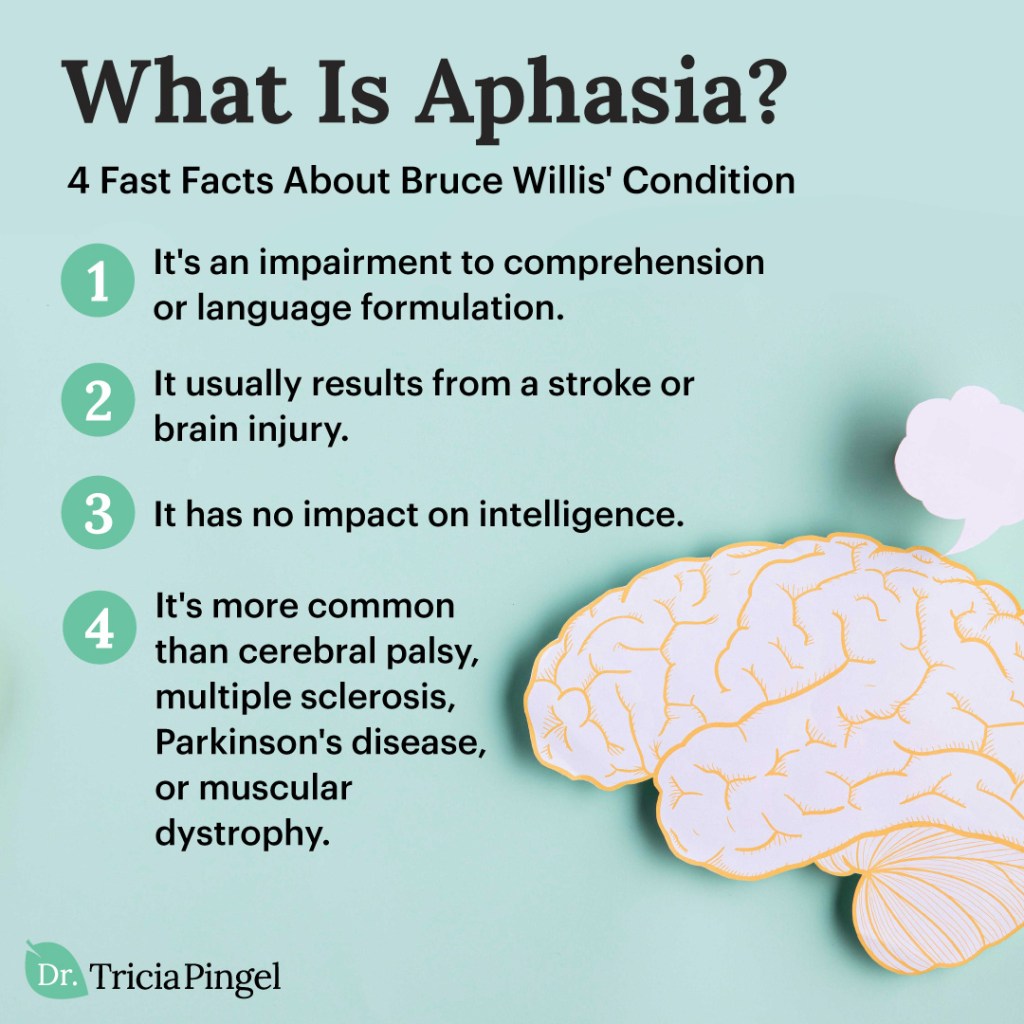Aphasia. If that word sounds familiar, it's likely because you heard it relatively recently in the news about Bruce Willis.
Unfortunately, Bruce Willis confirmed that he does, in fact, have aphasia. But what is it, exactly, and what's the prognosis? And how common is it really? And are there warning signs?
Today, I'm answering these questions and more. And I'm also sharing my personal stories of my experience with aphasia, as I've watched family members succumb to this condition
Keep reading …. This is one article you don't want to miss.
When my mother-in-law Carol was in her mid 50s, she started to have very minor memory loss. It began with just the little things, like forgetting what she just said or where she put something.
She recovered easily from those episodes and life continued on. But within a year or so, she would regularly lose her ability to form a specific word. You could see her internally struggling.
She would shake her head and often say “frustrating” or “I can’t.” And quite often, she could not form a whole sentence. Then she would be able to speak normally for a short period of time before her speech would go away again.
As time went on, moments of lucidity became less and less frequent.
You could tell that she was 100 percent present (at least in beginning), meaning what was happening to her wasn’t similar to dementia or delirium where the person may not know what’s happening.
Over the course of the next few months, she spoke less and less, as she would be unable to finish a whole sentence. She used to smile and nod along, but that also began to happen less frequently.
She would still have small moments of lucidity where could speak normally and share her thoughts. In those moments, she would share how unbearable it was to be aware of everything yet unable to communicate. She knew what was happening to her. She was a prisoner in her own body.
Ultimately, she was diagnosed with aphasia, and her condition progressed rapidly. Our family also believes she developed dementia, although we couldn’t really test her recall or ask her anything but yes or no questions.
Many times she would just stare blankly at us—and we’re still not sure if that was dementia or simply a lack of response.
One of my clearest memories is when she met my oldest Cameron. He was under a year old, but she was able to meet him prior to her passing. She smiled as she touched him and hugged both my husband Tyler and me.
To me, it seemed like she knew exactly who was there and that perhaps she just couldn’t understand and relay instructions. And that’s exactly what aphasia is: a loss in the ability to relay information.
Carol was 64 when she died, which means she spent the last decade of her life struggling with aphasia. Sometimes I wonder if there was even more going on, but we will never truly know.
Aphasia is often misunderstood. Given this, let’s break down what, exactly, aphasia is—and what it isn’t.
Here are four facts you should know:
1. Aphasia is a disorder that results in impairment to comprehension or language formulation. It can impact expression and understanding of language as well as someone’s ability to read and write.
2. It usually results from a stroke or injury to the left side of the brain, which is responsible for language. [1] That said, it can also result from a brain tumor or neurological disease.
3. Aphasia has no impact on intelligence.
4. It's more common than cerebral palsy, multiple sclerosis, Parkinson's disease, or muscular dystrophy combined! [2] And though it affects about 2 million Americans, many people still remain unfamiliar with aphasia.

Just as with my mother-in-law Carol, the warning signs of aphasia typically begin gradually and small before progressing
What begins as minor speech concerns often turns into difficulty communicating and even forming solid judgement.
According to The Cleveland Clinic, here are some of the major symptoms of aphasia: [3]
The prognosis for someone with aphasia depends on the cause. For example, if someone’s aphasia is due to a minor brain injury, that person may make a substantial recovery.
Alternatively, if the aphasia is due to a progressive neurological disease, which is known as primary progressive aphasia (PPA), it will continue to worsen. This usually appears between the ages of 50 and 70 and more commonly occurs in men. [4]
If you were to look at a brain scan of someone with PPA, it would likely show some atrophy in the left side of the brain.
Regarding treatment, aphasia is typically diagnosed by a speech-language pathologist following a suspected brain injury or following certain symptoms. Once diagnosed, the patient may be referred to a speech-language therapist to help them retain their ability to communicate.
For those with PPA, the treatment would focus more on improving quality of life by utilizing card with specific words or sentences or counseling the caregivers in the patient’s life.
The typical life expectancy of someone with PPA is up to 12 years after diagnosis. [5]
Because there’s a major lack of awareness of aphasia, one of the best things you can do is to continue to educate yourself.
The University of Michigan Aphasia Program offers some amazing resources to aid in your continuing education. Click here to learn more.
Additionally, if someone in your life has been diagnosed with aphasia, speak with a speech-language therapist to see how you can help your loved one. Offering support and understanding can go a long way in aiding their ability to retain quality of life